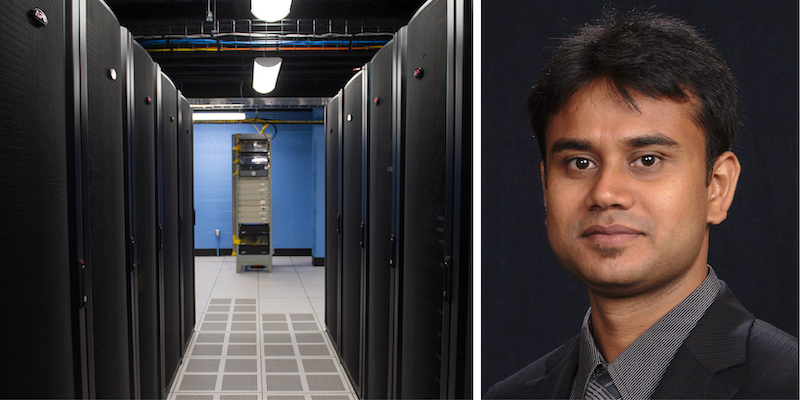Meet the Chair: Dr. Kalikinkar Mandal, NB Power Cybersecurity Research Chair
Author: UNB Research
Posted on Apr 30, 2021
Category: Research , Accolades

Dr. Kalikinkar Mandal has recently been appointed as the NB Power Cybersecurity Research Chair, supported by $500,000 in funding from NB Power. During his five-year term, his research agenda will focus on minimizing cybersecurity risks and improving privacy in the emerging smart grid realm.
Today’s electrical grid was built in the 1890s as a network of power transmission lines serving only to deliver electricity from the powerplant to a home or business.
Since then, power grids have been greatly improved with the advancement of technology and for increasing electricity demands.
These new smart grids use digital information, communication and computational technologies to enable two-way communication, intelligent monitoring, control and better demand-response. Modern grids create two significant changes from the originals: first, continuously monitor the state of the power system through data collection and data analysis and second, they allow information to be exchanged between the provider and the customer. Like the Internet, a smart grid has controls, computers, automation and new technologies and equipment that work together digitally to deliver electricity more efficiently than the old power grids.
There are many benefits associated with smart grid infrastructure. They can provide cost savings to customers and to utilities by lowering operation and management costs, as well as providing more accurate, real-time energy readings and fraud detection through remote management infrastructure. Smart grids can also supply a better quality of electricity and can use automatic rerouting to minimize the occurrence and impact of outages. And, finally, they are more sustainable for the environment, both through reducing consumption and the ability to integrate renewable energy systems.
However, because smart grids use digital technologies, they are also vulnerable to cyberattacks. Cyberattackers can launch various types of attacks against smart grids, including denial of service attacks to disrupt operations, stealing sensitive data and tampering with operational data and smart meter data to compromise privacy. Smart grids are a critical infrastructure which makes them a tempting target for attackers, as attacks may result in severe service disruption in areas like healthcare, transportation, public safety and water distribution.
Dr. Mandal will be working with NB Power to address these cybersecurity threats to smart grid infrastructure:
“My research plan is to develop security and privacy techniques for robust and secure smart energy infrastructure with improved cyberattack resiliency,” he said. “I will be investigating both the cybersecurity of power systems and the privacy concerns of consumers.
“It is a great opportunity to work with industry to solve real-world problems and develop new techniques for current and next-generation systems. We will also provide training and learning opportunities for graduate and undergraduate students, which will prepare them as cybersecurity leaders.”
Dr. Mandal's chair appointment supports research at the intersection of two areas of significant expertise and strength for UNB: next-generation energy systems and cybersecurity. These strategic areas represent clusters of existing and growing capacity that serve the needs of our partners, our society and our future.
Through direct applied research impact, increasing knowledge and providing training to tomorrow's generation of power and security experts, Dr. Mandal’s work will help address and resolve some of the greatest challenges facing our world.
About the chair
Dr. Kalikinkar Mandal completed a PhD in electrical and computer engineering from the University of Waterloo. He was a postdoctoral research associate at the University of Washington, Seattle for two years and worked at the University of Waterloo as a research assistant professor for 3 years. He joined the University of New Brunswick in July 2020. He also holds two master's degrees, one in computer science and one in mathematics.
Dr. Mandal’s research broadly focuses on cryptography, cybersecurity and privacy, and more specifically on lightweight cryptography, privacy-preserving computation, security and privacy in smart grid and Internet of Things, trusted computing, and high-speed cryptography.
More information:
Dr. Kalikinkar Mandal | Faculty of Computer Science | UNB Cybersecurity Institute of Canada
Research at UNB | Graduate Studies at UNB | Postdoctoral fellowships